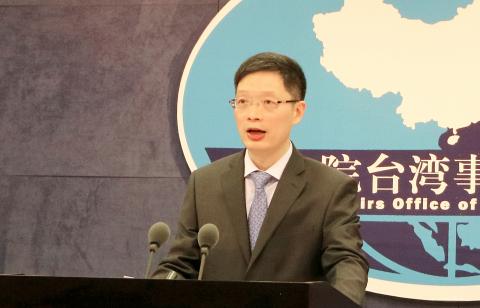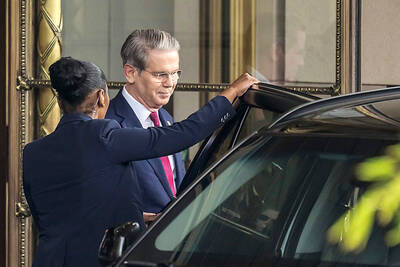China’s Taiwan Affairs Office (TAO) yesterday said Beijing has extended economic benefits and subsidies to Taiwanese businesses, civic groups, cultural workers and artists in China that were previously exclusively for Chinese citizens, a step that critics said represents an escalation in Beijing’s use of “united front” tactics.
Hailing the measures as “unprecedented,” TAO spokesman An Fengshan (安峰山) said the 31 incentives, effective immediately, would allow “Taiwanese compatriots to share in the opportunities arising from China’s economic development.”
The incentives seek to bring an “equality of opportunity” to Chinese and Taiwanese who are studying, starting businesses, working or living in China, An said.

Photo: CNA
The policy applies to Taiwanese businesses and entities involved in a wide variety of commercial and noncommercial activities.
The incentives include permitting Taiwanese firms to invest in Chinese businesses, receive tax breaks, participate in the “Made in China 2025” initiative and National Key Research and Development Programs, bid for government procurement contracts, and manage semi-public enterprises, the TAO said.
Beijing is also encouraging the involvement of Taiwanese entrepreneurs in the Belt and Road Initiative, particularly in China’s midwestern and northeastern regions, it said.
Taiwanese-owned agricultural entities are to receive the same subsidies and benefits that are available to their Chinese counterparts, it added.
Taiwanese are now eligible to enroll in certification exams for 134 professions and become members of Chinese industry associations and trade groups to “take part in work at the grassroots level,” the TAO said.
Beijing is to relax restrictions on cross-strait cooperation in film and TV productions to facilitate collaboration, it said, adding that restrictions on Taiwanese publications and films marketed in China have been removed.
Taiwanese are now eligible to register for and win prizes and awards in the Chinese Cultural Heritage Development Excellence competition, it added.
The 31 incentives were “tailor-made” for Taiwanese, he said.
The Mainland Affairs Council said that it was aware of Chinese efforts to induce Taiwanese to trade political recognition for profit and that it would be on alert regarding such developments and their potential effects on Taiwanese industry and skilled workers.
Such endeavors over the past few years have been attempts to turn Taiwanese by trying prove the validity of China’s claims, the council said.
Taipei has placed significant emphasis on policies that would improve Taiwan’s economy, grow its technology industry and foster skilled workers among the younger generation, it said.
The council called on China to work toward introducing mutually beneficial policies that are free of political manipulations, saying that only then could benign cross-strait interactions be maintained.
Many of the measures and policies announced by China require interagency collaboration, so whether Beijing actually has such plans and the actual rate of implementation of such policies remains to be seen, the council said.
The council cautioned Taiwanese that there are differences in systems, regulations, market environment and values across the Taiwan Strait, saying that they should be circumspect in their risk assessment to maintain their rights and safety.
Additional reporting by CNA

Taiwanese Olympic badminton men’s doubles gold medalist Wang Chi-lin (王齊麟) and his new partner, Chiu Hsiang-chieh (邱相榤), clinched the men’s doubles title at the Yonex Taipei Open yesterday, becoming the second Taiwanese team to win a title in the tournament. Ranked 19th in the world, the Taiwanese duo defeated Kang Min-hyuk and Ki Dong-ju of South Korea 21-18, 21-15 in a pulsating 43-minute final to clinch their first doubles title after teaming up last year. Wang, the men’s doubles gold medalist at the 2020 and 2024 Olympics, partnered with Chiu in August last year after the retirement of his teammate Lee Yang

FALSE DOCUMENTS? Actor William Liao said he was ‘voluntarily cooperating’ with police after a suspect was accused of helping to produce false medical certificates Police yesterday questioned at least six entertainers amid allegations of evasion of compulsory military service, with Lee Chuan (李銓), a member of boy band Choc7 (超克7), and actor Daniel Chen (陳大天) among those summoned. The New Taipei City District Prosecutors’ Office in January launched an investigation into a group that was allegedly helping men dodge compulsory military service using falsified medical documents. Actor Darren Wang (王大陸) has been accused of being one of the group’s clients. As the investigation expanded, investigators at New Taipei City’s Yonghe Precinct said that other entertainers commissioned the group to obtain false documents. The main suspect, a man surnamed

US Secretary of the Treasury Scott Bessent and US Trade Representative Jamieson Greer began talks with high-ranking Chinese officials in Switzerland yesterday aiming to de-escalate a dispute that threatens to cut off trade between the world’s two biggest economies and damage the global economy. The US delegation has begun meetings in Geneva with a Chinese delegation led by Chinese Vice Premier He Lifeng (何立峰), Xinhua News Agency said. Diplomats from both sides also confirmed that the talks have begun, but spoke anonymously and the exact location of the talks was not made public. Prospects for a major breakthrough appear dim, but there is

The number of births in Taiwan fell to an all-time monthly low last month, while the population declined for the 16th consecutive month, Ministry of the Interior data released on Friday showed. The number of newborns totaled 8,684, which is 704 births fewer than in March and the lowest monthly figure on record, the ministry said. That is equivalent to roughly one baby born every five minutes and an annual crude birthrate of 4.52 per 1,000 people, the ministry added. Meanwhile, 17,205 deaths were recorded, resulting in a natural population decrease of 8,521, the data showed. More people are also leaving Taiwan, with net